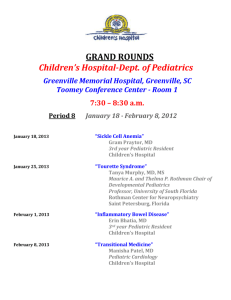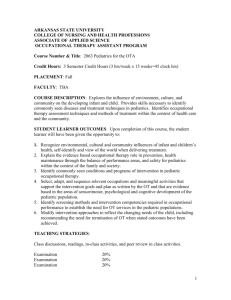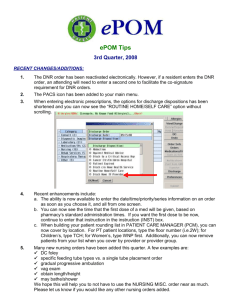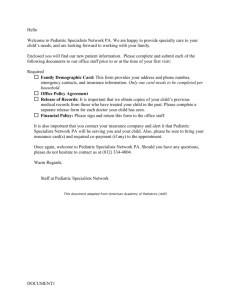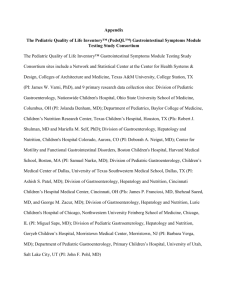Pediatrics (IV year)
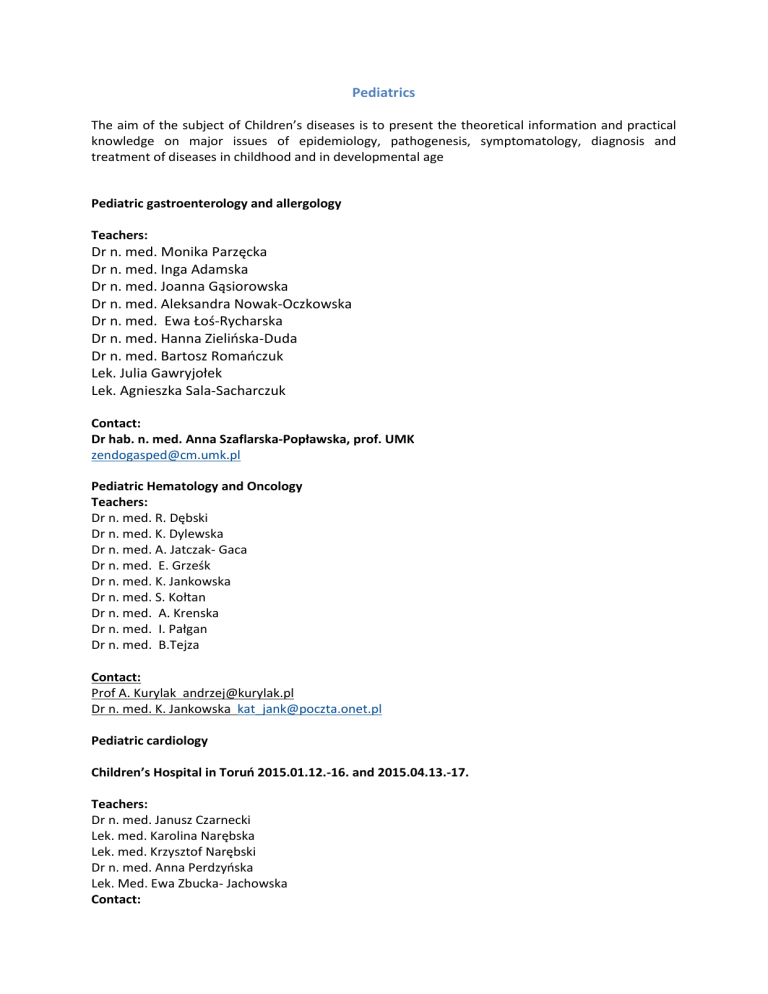
Pediatrics
The aim of the subject of Children’s diseases is to present the theoretical information and practical knowledge on major issues of epidemiology, pathogenesis, symptomatology, diagnosis and treatment of diseases in childhood and in developmental age
Pediatric gastroenterology and allergology
Teachers:
Dr n. med. Monika Parzęcka
Dr n. med. Inga Adamska
Dr n. med. Joanna Gąsiorowska
Dr n. med. Aleksandra Nowak-Oczkowska
Dr n. med. Ewa Łoś-Rycharska
Dr n. med. Hanna Zielińska-Duda
Dr n. med. Bartosz Romańczuk
Lek. Julia Gawryjołek
Lek. Agnieszka Sala-Sacharczuk
Contact:
Dr hab. n. med. Anna Szaflarska-Popławska, prof. UMK zendogasped@cm.umk.pl
Pediatric Hematology and Oncology
Teachers:
Dr n. med. R. Dębski
Dr n. med. K. Dylewska
Dr n. med. A. Jatczak- Gaca
Dr n. med. E. Grześk
Dr n. med. K. Jankowska
Dr n. med. S. Kołtan
Dr n. med. A. Krenska
Dr n. med. I. Pałgan
Dr n. med. B.Tejza
Contact:
Prof A. Kurylak andrzej@kurylak.pl
Dr n. med. K. Jankowska kat_jank@poczta.onet.pl
Pediatric cardiology
Children’s Hospital in Toruń 2015.01.12.-16. and 2015.04.13.-17.
Teachers:
Dr n. med. Janusz Czarnecki
Lek. med. Karolina Narębska
Lek. med. Krzysztof Narębski
Dr n. med. Anna Perdzyńska
Lek. Med. Ewa Zbucka- Jachowska
Contact:
Dr n. med. Janusz Czarnecki jcmed@autograf.pl
Syllabus ( Pediatric gastroenterology and allergology)
I. Name of the unit offering the course a) The Chair and Department of Pediatrics, Allergology and Gastroenterology b) The Departament of Pediatric Endoscopy and Gastrointestinal Function Testing
II. Head of the unit :
ad. I a) prof. dr hab. Mieczysława Czerwionka-Szaflarska,
ad. I b) dr hab. n. med. Anna Szaflarska-Popławska prof. UMK
III. Faculty of Medicine, Medical Program, the 4 th year
IV. Subject: Children’s diseases
V. Subject Hours: seminares - 40 h, exercises - 80 h, total -120 h
VI. Form of credit: Credit with grade
VII. ECTS points: 7
VIII. Aim of the subject
The aim of the subject of of pediatric gastroenterology and allergology is to present the theoretical information and practical knowledge on major issues of epidemiology, pathogenesis, symptomatology, diagnosis and treatment of gasroenterological and alergological diseases in childhood and in developmental age (up to 18 years old).
IX. Topics of lectures/ tutorials/ seminars
The Chair and Department of Pediatrics, Allergology and Gastroenterology
The Departament of Pediatric Endoscopy and Gastrointestinal Function Testing
1.
Topics of lectures / tutorials of pediatric gastroenterology and allergology:
1. Food allergy
2. Asthma and allergic rhinitis
3. Functional gastrointestinal disorders
4. Inflammatory bowel disease
5. Acute and chronic diarrhea
6. Ulcers of the stomach and duodenum
7. Celiac disease
8. Diseases of the liver and pancreas
9. Life-threatening condition in pediatric gastroenterology
10. Test
Topics of tutorials of pediatric gastroenterology and allergology
1.
Food allergy - a case of the patient with an allergy to food, skin tests, DBPCFC. Cross-allergy.
Elimination diet, presentation of preparations for infants with cow's milk proteines allergy.
Rules of calcium and vitamin D supplementation in children.
2.
Asthma - the presentation of a patient with asthma, the principles for assessment of asthma control, lung function tests in bronchial asthma - measurement of PEF, the principles of spirometry in children, principles of asthma drug inhalation. Atopic dermatitis in children - a case, evaluation of skin lesions by SCORAD, care and treatment of patients with AD, the safety of local corticosteroids.
3.
Abdominal pain in children - a case, the principles of diagnosis, the warning signs of abdominal pain in children. Constipation in children - diagnostic and therapeutic principles of diet.
4.
Acute and chronic diarrhea in children - a case report and diagnostic principles.
Practical assessment of nutritional status in children. Malnutrition in pediatrics - case studies, the principles of enteral nutrition through a gastrostomy, and the indications for parenteral nutrition.
5.
Gastroesophageal reflux disease in children - a case report. Inflammatory bowel disease - presentation of cases.
6--10 Classes in The Departament of Pediatric Endoscopy and Gastrointestinal Function Testing
X. Booklist (basis/ additional): a) The Chair and Department of Pediatrics, Allergology and Gastroenterology
Illustrated Textbook of Paediatrics: with STUDENT CONSULT Online Access Tom Lissauer, Graham
Clayden, Mosby; 4 edition (30 Sep 2011)
Practical Paediatrics: With STUDENT CONSULT Online Access David Isaacs, Don M. Roberton, Michael
South Churchill Livingstone; 6 edition (November 13, 2007)
Clinical Paediatrics and Child Health David Candy, Graham Davies, Euan Ross, Saunders, Toronto, last edition
XI. Detailed list of required practical skills and confirmation of completing
Detailed list of required practical skills and confirmation of completion:
KNOWLEDGE - know the symptoms and the most common disease entities in the field of gastroenterology, pediatric cardiology and respiratory diseases and inflammatory tissue
SKILLS - At the end of the course, the student shall be able to: use the medical nomenclature, conduct an appropriate physical examination of children, interpret laboratory investigations, prepare diagnostic plan and treatment plan, including dietetic treatment
Gastroenterology:
- interpretation of the results of endoscopy
- interpretation of the results of functional gastrointestinal test
- assessment of nutritional status of children and knowledge of nutritional recommendations for gastrointestinal diseases
Allergology
- assessment of the degree of asthma control
- ability to interpret spirometry and skin prick tests results
XII The methods and criteria of assessment
- The presence et all the exercises and seminars
- Theoretical preparation for classes on the basis of the given literature
- A written final test
- Confirmation of completing practical skills
Syllabus ( Pediatric Hematology and Oncology)
I.
Name of the unit offering the course: Department of Pediatric Hematology and Oncology
II.
Head of the unit: Prof. Mariusz Wysocki
III.
Faculty of Medicine, Medical Program, year IV
IV.
Course coordinator: Prof. Andrzej Kurylak, Dr Katarzyna Jankowska
V.
Form of classes (lectures, tutorials, seminars)
Seminars
Tutorials
Credit
8 hrs
20 hrs
2 hrs
VI.
Form of crediting: Credit
VII.
Number of hours: 30 hours
VIII.
Aim of the course
A. Course is designed for medical students to get basic knowledge about the most frequent acute infections of upper and lower respiratory tract in children: Principles of etiology, diagnostics, x-ray examinations and therapy, including antibiotic therapy and aerosol therapy.
B. Presentation of basics of chronic lung disorders in children: bronchial asthma, cystic fibrosis and tuberculosis: etiology, diagnostics, x-ray examinations and therapy.
IX.
Topics of seminars
1.
Upper respiratory tract infections. Bronchitis and bronchiolitis.Recurrent obstructive bronchitis
2.
Pneumonitis
3.
Systemic diseases of connective tissue in children
4.
Chronic lung diseases: cystic fibrosis, tuberculosis
Topics of tutorials
1.
Hiperbilirubinemia
2.
Crying and colic in infants
3.
Sleep disorders
4.
Breath-holding attacks
5.
Thumb suck and other habits
6.
Cough (self-defence mechanism, pathological symptom)
7.
Adenotomy and tonsilectomy,
8.
Pain of the ear
X.
Self-study topics
1. Developmental screening and assessment
2. Vaccination
3. Principles of antibiotic therapy
4. Diseases of neonatal period
XI.
Booklist (basic / additional)
Lissauer T, Clayden G. Illustrated Textbook of Paediatrics.
Levy HB, Sheldon SH, Sulayman RF. Diagnosis and management of hospitalized child.
XII.
Detailed list of required practical skills and confirmation of completing
Required practical skills and confirmation of completing
Pediatrics (IV year)
Student Name and Surname:
Year IV, group:
Academic year:
Confirmation Comments Practical skills
Pulmonology:
- assessment of respiratory tract function,
- assessment of bronchial asthma severity
- application of inhaled drugs
Date
Syllabus Pediatric cardiology
I.
Name of the unit offering the course: Department of Pediatric Hematology and Oncology
II.
Head of the unit: Prof. Mariusz Wysocki
III.
Faculty of Medicine, Medical Program, year IV
IV.
Course coordinator: Prof. Mariusz Wysocki
V.
Form of classes (lectures, tutorials, seminars)
Seminars 15 hrs
Tutorials
Credit
17 hrs
2 hrs
VI.
Form of crediting: Test
VII.
Number of hours: 34 hours
VIII.
Aim of the course
A. The course is designed for medical students to get basic knowledge about the most frequent congenital diseases , diseases of myocardium and hypertension in children: Principles of diagnostics, cardiac examination ,electrocardiography, echocardiography, x-ray examinations, routine laboratory tests.
B. Presentation of congenital diseases in children: Atrial Septal Defect , Ventricular Septal Defect,
Coarctation of the Aorta , Valvular Aortic Stenosis, Mitral Valve Prolaps, Pulmonary Stenosis,
Pulmonary Hypertension, Heart Failure, Hypertension : diagnostics and therapy.
IX.
Topics of seminars
1.
Non cyanotic congental heart diseases
2.
Cyanotic congenital heart diseases
3.
Heart Failure
4.
Diseases of the myocardium.
5.
Disturbances of rate and rhythm. Syncope.
6.
Hypertension secondary and primary.
Topics of tutorials :
1.
Tools of Diagnosis
2.
Echocardiography
3.
Electrocardiography.
4.
Holter monitoring.
5.
Hypertension. Measurement. ABPM.
6.
Table Blood Levels for Girls( Boys) by Age and Height Percentile.
X.
Self-study topics
1.
Cardiac Examination
2.
Electrocardiography and assessment
3.
Holter monitoring
4.
Hypertension .Measurement. ABPM. Management algorithm.
5.
Table Blood Levels for Girls(Boys) by Age and Height Percentile
XI.
Booklist (basic / additional)
1.Nadas’ Pediatric Cardiology .Edited by John F. Keane, M.D. James E. Lock, M. D. Donald C. Fyler,
M.D /basic/.
2.Nelson Textbook of Pediatrics/ additional/
3.Echocardiography in Pediatric Heart Disease .A. Rebecca Snider .Gerald A. Serwer/additional/
XII.
Detailed list of required practical skills and confirmation of completing
Required practical skills and confirmation of completing
Pediatrics (IV year)
Student Name and Surname:
Year IV, group:
Academic year:
Date Confirmation Comments
Practical skills
Pediatric Cardiology:
-assesment of murmurs
-assesment of congenital heart diseases
-assesment of electrocardiography
- assessment of hypertension , measurement, ABPM
Rules and regulations
A. Name of the teaching entity: Paediatrics, Haematology and Oncology Department
B. Name of the teaching supervisor: Prof. Andrzej Kurylak
C. Course: Children’s illnesses
Medical programme, years: 4, 5, 6
I. Form and conditions for the obtaining of a course credit
Attendance at all the classes is a condition for the obtaining of a course credit in the given year of study. Class absences need to be made up for. Students shall only be permitted to take a test or an exam if they have obtained credits in their Practical Skills Sheets provided to them at the start of the
4th, 5th, and 6th year of study.
II. Form and conditions for the obtaining of credits for discussions/workshops (in accordance with I. above).
III. Form and conditions for the obtaining of a test credit
4th and 5th year students who have completed a course block are required to obtain a credit for the final test (written or oral) by a date specified in the course block timetable.
IV. Form of a course examination
6th year students shall only be permitted to sit the final exam in children’s illnesses if they have obtained credits for all the discussions, seminars, if they have developed a case history and presented their credits in the Practical Skills Sheet.
Children illness examination conditions are governed by Appendix 1 hereto (attached).
V. Conditions for the making up for absences from classes for valid reasons or classes for which students have not obtained credits for other reasons
Making up for discussion absences shall only take place at a time and date scheduled by the teaching supervisor. Students shall also be required to obtain a credit for a seminar session they have been absent from from the seminar instructor. (Final) test absences shall be made up for at a scheduled date after the end of the autumn or spring semester in the given academic year.
Students who do not report for a test at a scheduled time and date will receive an Unsatisfactory grade. If a student is absent for a valid reason, the absence should be reported within three days of the test date or within three days after the end of the period covered by a doctor’s certificate. The test date is agreed upon with the teaching supervisor.
With regard to credit matters, students may appeal against their test results within three days of their announcement to the unit head who may order that the student’s knowledge and/or skills should be re-examined.
VI. Deadlines for the submission of studies, reports or any other forms required by the given university unit:
Deadline: by the end of the last course block in the given year.
VII. General and specific health and safety regulations applicable to the teaching process at the given unit.
Students are required to wear protective clothes on the Clinic’s premises: a white coat or a shirt and skirt/trousers, and they are required to change shoes. The cloakroom is on the ground floor.
Students are required to comply with the health, safety and sanitary regulations adopted by the Clinic which shall be communicated to them before the commencement of classes by assistants.
Failure to comply may result in non-admission to classes.
EACH STUDENT SHOULD READ THE ABOVE POLICY BEFORE THE START OF THE COURSE IN
CHILDREN’S ILLNESSES
............................................. .............................................. signed by the Clinic
Manager signed by the Teaching Supervisor
........................................... the Medical Department
............................................... Students’ Council of
Dean of the Medical Department
Date:
Policy on the examination in children’s illnesses for medical programme students
The examination in children’s illnesses is a comprehensive examination. i.e. it consists of the theory and practice parts in a test format, and the theory part again (oral exam). The test exam is uniform for the all the students in the given year of study and you can only take the oral exam if you have passed the test exam.
Oral examiners are independent research fellows. Students select their examiners within the limits of the number of students allowed to be examined by each examiner.
Only those who have complied with all their teaching process requirements are permitted to take the comprehensive examination in children's illnesses.
The test exam in children’s illnesses takes place at a time and date agreed upon with the year prefect. The examination includes 100 theory questions and 10 practice questions (with a point for each right answer). The examination time depends on the size of the examination questions, as follows:
<= 35,000 characters: 120 minutes;
> 35,000 <= 38,000 characters: 130 minutes;
> 38,000 <= 41,000 characters: 140 minutes;
> 41,000 <= 44,000 characters: 150 minutes;
> 44,000 <= 47,000 characters: 160 minutes;
> 47,000 <= 50,000 characters: 180 minutes;
Students should bring their record books or USOS data to exams with entries confirming that they have obtained course credits. Where children’s illness classes end in the autumn semester for all the groups, it is possible to take the exam in the winter examination period provided that the group prefects and the year prefect request that.
The examination test should be taken without consulting others. Any contact with others or use of forbidden materials may lead to terminating the test exam and the student's failure to obtain a credit for the exam.
Any printing errors noticed in a test by an examinee may be reported thereby in writing; they will be verified during the exam. Any medical errors noticed in test questions by an examinee may be reported thereby in writing during the exam; they will be verified after the exam, before the announcement of its results.
Test exam grades are as follows:
< 60 % (0-65 points) – unsatisfactory (2)
>=60% i <68 % (66-74 points) – satisfactory (3)
>=68% i <75% (75-82 points) – satisfactory plus (3.5)
>=75% i <82% (83-90 points) – good (4)
>=82% i <90% (91-98 points) – good plus (4.5)
>=90% (99-110 points) – very good (5)
The final grade for the comprehensive examination in children’s illnesses is the average of the grades for both of its parts, provided that the grade for each part is satisfactory.
Students who fail the exam on the first scheduled date take the exam on the second scheduled date during the re-sit examination period, on the same terms and conditions as on the first scheduled date. The examination date will be agreed upon with the year prefect. If the number of people who take the re-sit examination is small, it may be taken orally.
Failure to sit an exam on the scheduled date without a valid explanation is tantamount to getting an Unsatisfactory grade entered in the student's record book and the examination sheet. The reasons for such absence should be provided to the secretariat of the clinic which organises the examination within three days of the examination date.
When the summer session takes place in an odd year, the examination is organised by the
Paediatrics, Allergology and Gastroenterology Department and Clinic, and when it takes place in an even year, the examination is organised by the Paediatrics, Haematology and Oncology Department.
Exam results are entered by oral examiners.
The selection and preparation of questions in each year is the responsibility of Department
Heads and teaching supervisors.

